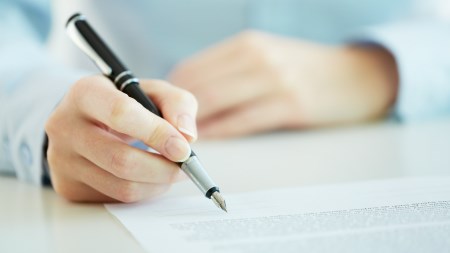Important points to consider and pertinent questions to ask, before you [sign a lease agreement.][1]
People often rush into signing a lease agreement for fear of losing the property to another desperate tenant. However, before you sign your lease agreement, stop and take some time to make sure you’ve got your ducks in a row. Renting a property can be a smooth ride, or it can turn into a complete nightmare. Make sure that you have all the information you need and don’t let anyone pressure you into signing a lease agreement without reading through it properly. This should help you avoid a few nasty surprises further down the road.
Here are 10 things to do before you pick up the pen and sign:
1. Get everything in writing
Make sure your lease agreement has all the relevant information in it and then read the entire lease agreement. This is of utmost importance when renting a property, to avoid any surprises later on. You and your landlord will then be on the same page about everything that you had discussed verbally, and it will be clear exactly what each party’s responsibilities are.
2. Establish a good relationship
Be polite and professional when meeting the landlord. Creating a good impression from the start is a great way to land a successful rental negotiation. It’s in your best interests for a landlord to trust you because the more they trust you the happier they will be with you renting their property. Bear in mind that you will be living on their property and they will want you to take good care of it. Be open, ask questions and take the time to form a good relationship with the landlord from the initial meeting.
3. Find out what changes you can make
Be clear on what alterations can be made to the property. These include; what your landlord’s policy is on making extra keys, hanging artwork, painting the walls, changing the lights, and so forth. It is better to know this information from the outset so that you can work around what your landlord does or doesn’t allow. Rather know the rules upfront, than do an alteration and find out that your landlord is unhappy with it afterward.
4. Investigate the landlord
Do some research into the landlord to make sure that they are the rightful owners of the property. Consider what will happen if things go wrong and ask the landlord pertinent questions about what they would do in these situations. Take note of the landlord’s response to any queries you have about repairs on the property – this response will show a lot about how the landlord will react to a difficult situation in the future.
5. Check the parking
Be clear on where you can park and make sure that it’s easy to get in and out of. Check the security around where your car will be parked and make sure that it’s in a safe location. If you need to park in the street, make sure there are parking bays near your property, and that the street doesn’t get too full in the evenings.
6. Visit the property again
It’s a good idea to visit the property on a different day and at a different time. This will give you a better feel for what the property is like during the day and at night, as well as during the week and on the weekend. Things like different noises, different lights, and different weather conditions can all play a factor in whether you feel comfortable in a home or not. So, visiting a property more than once can help you make a more informed decision.
7. Check all appliances and fixtures
Don’t assume that everything works. During your first viewing, go through the house and turn on taps, flush toilets, switch on the oven, and any other appliances that are part of the deal, to make sure that everything is in working order. Take note of anything that isn’t working and bring up any concerns to the landlord at the time, so that they can either repair or replace anything that may need it, before you move in.
8. Document the property’s condition
Take a few walks through the property and make sure every bit of damage (big or small) is documented in a snag list. You and your landlord should both sign this, in acknowledgment that these issues were there before you moved in and that they are not your responsibility to fix. This will help in the future, should any issues arise with regards to repairs on the property. It will also be useful when you vacate the rental property as both you and your landlord will be able to distinguish between pre-existing and new damage.
9. Find out about roommates and house sitters
If you think you may want a roommate at some point, check with your landlord what their rules would be about getting one. If you’re away a lot, you may want someone to stay on the property while you’re gone. Make sure your landlords approve of this and are aware of any people that you may have staying in your home while you’re not there.
10. Understand the termination policy
You never know what could happen in your life and when you may need to move. Make sure that you’re familiar with the termination policy of your lease so that you know exactly what is required to get out of the lease early. Check for things like how many months’ notice you need to give, whether there are any reductions to your security deposit, and what the cleaning requirements are. It’s always good to have a game plan ready for a quick exit, even if you don’t plan on moving any time soon.
Make sure to double (or even triple) check your lease agreement and consult your landlord with any changes you may have, before you sign. Once you’ve considered these steps, you should be ready to sign a lease agreement and you’re likely to avoid any nasty surprises down the line.





